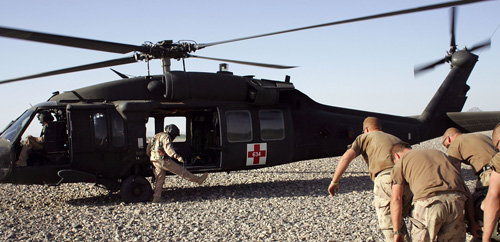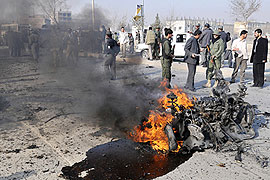Bush loses out in Bucharest
Marwan Bishara on why the US is not getting its own way at the Nato summit.

 |
| Nato forces have suffered a number of casualties in Afghanistan [GALLO\GETTY] |
As the Nato conference in Bucharest comes to a close, it is clear George Bush did not get much of what he bargained for.
There was no big bang as Nato postponed its membership action plan for Georgia and the Ukraine and approved an already agreed upon missile system.
Sceptical West Europeans have not turned their back on the Bush administration, but neither did they behave as generously or acquiescently as they have at previous summits.
Bush’s adventures in Afghanistan and Iraq have hurt Washington’s standing within the alliance, even if it remains its only prospective leader.
The US might get hundreds more troops for Afghanistan, but not a real and effective European commitment for the long term.
Force row
It’s remarkable how the greatest military alliance in history is incapable of defeating the Afghan fighters.
 |
| Taliban fighters are set to carry out a new offensive against Nato forces [AFP] |
For practical purposes Nato is to beef up the Afghan army – which presently controls less than 30 per cent of the country’s territory – and hope for the best.
The Europeans believe only the Afghans can win against the Taliban.
And for this to happen the Afghan president, Hamid Karzai, asked for a commitment to train and equip 120,000 troops, far more than the 85,000 already agreed.
Training the army needs an immediate extra 3,000 Nato trainers, none of whom were made available at the summit, alas.
Trouble in Pakistan
Needless to say, none of this will do the Republicans much good in an election year.
With escalation in Iraq, further deterioration in Afghanistan will make it far more difficult for the Bush presidency to claim any success of any sort.
Meanwhile, the US and its Nato allies might intimidate or bribe Pakistan into helping to deal with al-Qaeda and the Taliban.
Pakistan enjoys major US strategic and military aid that is conditional on Islamabad’s complicit help in the war against al-Qaeda and the Taliban.
Today, even the likes of US presidential candidate Barack Obama threaten to use force against targets within Pakistani territory if its government proves unhelpful, an act that would undermine the country’s political and military leadership.
However, the new Pakistani government and its future military command is said to lean towards accommodation rather than confrontation with the Taliban, in order to avoid an over-spill into their own country, making an already fragile and difficult situation uncontrollable.
Missile defence?
 |
| Czechs have protested against the US missile system being placed in their country [EPA] |
No one has yet enlightened me as to why Nato or Europe needs a missile system, unless it’s meant for offensive purpose, such as attacking Iran and preparing to defend against missile attacks against its bases.
And even then, it’s more probable that Iran would attack regional US bases rather than far flung ones.
Upsetting Russia on this has also proved counterproductive and could only lead to a new arms race in Europe and Asia, something the Europeans, especially Germany and France, are worried about.
Already Moscow is taking Cold War type measures and China has reportedly increased its military budget by a fifth and some in Washington claim it increased it by a third.
New threats
Russia was the big white elephant in the Romanian parliament building.
The Russian president threatened to cancel his visit to the Romanian capital if Nato went ahead with expansion towards its areas of influence.
Moscow did help and can do more in places like Afghanistan and Iran. But Putin needs incentives to do so.
He has the will and the desire to co-operate with the US and Europe (as it did between 1996 and 2003 when it contributed more troops to Nato peacekeeping operations than any other country) but not when Russia is humiliated by a Washington adamant on extending Nato’s reach to its very immediate borders.
Ukraine and Georgia’s membership could wait for a decade in spite of the Bucharest meeting to extend its membership to those two ex-republics of the Soviet Union.
At the end of the day it will be geography, not strategy, that will determine the nature of East European security in the long term.
Meanwhile, Nato officials are trying to expand the alliance’s agenda to include new threats (asymmetrical ones such as cyber attacks, terrorism and others) that will take many years to define in a single doctrine.
All the while its partners are becoming more numerous than its members with a far more complex set of challenges than dealing with the Cold War threat from the Warsaw pact.
It has become clear that the more Nato expands the less effective it has become.
If Washington is to expect more European help, it will have to accept more European autonomy in defense and decision making.
And even then, the Europeans remain generally reluctant to increase their military budget to four per cent of their GDP as Washington would want them to do in order to share the burden of its adventures.
Marwan Bishara is Al Jazeera’s senior political analyst.